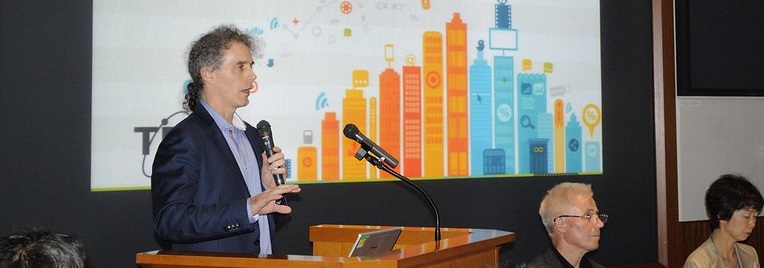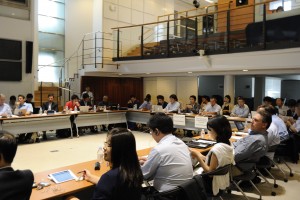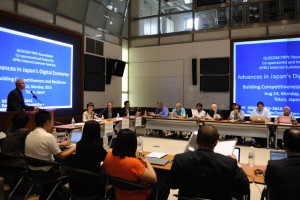

In partnership with GLOCOM, the Association of Pacific Rim Universities (APRU), and Keio International Center for the Internet & Society (KICIS), TRPC organized the second in the Going Digital forum series entitled “Advances in Japan’s Digital Economy: Building Competitiveness and Resilience” on Monday, Aug 24, 2015 at the Mita Campus, Keio University, Tokyo, Japan.
The purpose of the forum was two-fold: first to share the research and the lessons arising from TRPC’s white paper “Going Digital: The Status and Future Potential of the Internet-Based Economy in Asia” and second, to bring together various stakeholder groups in Japan to discuss policy options to foster a wide-reaching transition towards a digital economy.
The half-day forum saw over 65 participants, including 30 senior government and policy attendees of the APRU Summer Seminar from over 10 countries across Asia and the US, as well as the local audience from the public, private and academic sectors. The tri-party collaboration with the two leading think tanks in Japan and diversity of participants paved the way for a lively exchange and debate.


- Businesses: Rakuten, Yahoo Japan, NTT Commuications, Fujitsu, Sony, NEC, Toshikeikaku Inc , Gurunavi Inc, iemo, DNP Co Ltd, NIFTY Corporation, Accenture
- Government: National Strategy Office of ICT/Cabinet Secretariat (Japan), Ministry of Internal Affairs and Communications(Japan), Ministry of Foreign Affairs (Japan), Agency for Cultural Affairs (Japan), the Federal Communications Commission (FCC) and State Department (USA), Infoomm Development Authority (IDA), Ministry of ICT (Indonesia), Communication and Multimedia Commission (Malaysia), Department of Communications (Australia),
- Trade Associations: Future Conduct Support Organisation, Information Technology Promotion Agency, Japan Agricultural Information Systems Association
- Media: Kyodo News, Asahi Interactive
- Academia: Myoko University, Waseda University, Tokyo University, Kyoto University, Kokaguin University, The Open University, Meiji University, Keio University, Hong Kong University, University of Malay, University of Putra Malaya, University of Indonesia, Korea University, SUNY Korea, Yonsei University, Tsinghua University, Beijing Normal University, University of California – San Diego, University of Southern California, Stanford University




The panel discussions that followed focused on what the current challenges are for traditional sectors, education and agriculture in particular, to further leverage the Internet and technology to revitalize these stagnating industries and what can be done to foster the transition towards a digital economy.
In education, Massive Open Online Courses (MOOCs) have a strong potential to retool Japan’s aging population and improve labour mobility. MOOCs in Japan had a relatively late start (with JMOOC launching in 2014) but have grown steadily since. The majority of MOOC users are from the older segment of the population (i.e. age 30 or above), illustrating how these Internet-based tools are addressing the education and re-training gap that exists: lifelong learning. MOOCs providers are focused on providing capacity building and vocational training opportunities to users so that they could build expertise or skills to further their careers or take on a different occupation. MOOC providers, however, are having difficulty scaling up, as open education culture is not widespread in Japan and inter-faculty/school rivalry or questions on content copyright still tend to get in the way.
With regard to agriculture, panelists pointed to issues of data incompatibility across existing farming systems and the lack of interoperability as barriers for the farming industry in taking up ICTs and new technology tools. There is also strong resistance among agriculture co-ops to hold to the traditional ways of farming (i.e. ledgers). A paradigm shift among Japanese farmers is needed so that field knowledge in farming could be digitized, captured and shared with a new generation of farmers. With the average age of farmers in Japan now 65 years, this is an urgent issue in a highly protected sector of the national economy. Panelists also stressed that government and industry players need to promote open platforms and data standardization in order to move forward in the digital age.
The forum staged a lively discussion on the “cultural aspect” of policy making. While prescriptive policies are in principle not encouraged, Japan businesses and traditional industries may benefit from seeing a top-down vision and framework to encourage the use of the Internet.
The Japanese version of the “Going Digital” whitepaper and key summary can be downloaded here.
